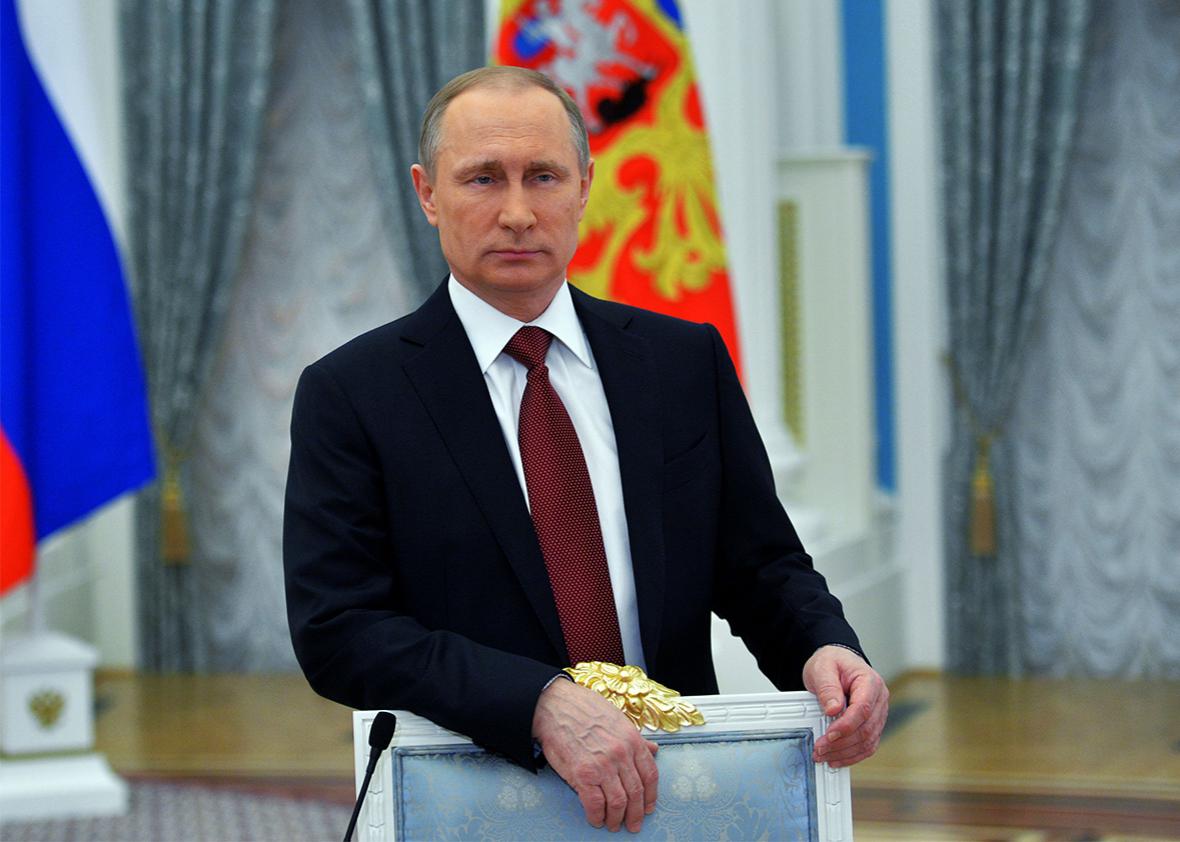When Vladimir Putin announced the withdrawal of most Russian troops and fighter jets from Syria this past Monday, two questions came to mind: Is he serious? If so, what does it mean?
The planes started flying out on Tuesday, so he does seem serious. (Though he’ll leave anti-aircraft batteries behind.) As for the meaning, the Kremlin press service explained, in a public statement, “Russia’s armed forces have fulfilled their main mission.”
Was this analogous to the “Mission Accomplished” banner prematurely hoisted on the USS Abraham Lincoln, as George W. Bush proclaimed an “end to major combat operations” in Iraq? Was it more like Sen. George Aiken’s 1966 proposal to “declare victory and bring the troops home” from Vietnam? Or has Putin’s six-month intervention in Syria really accomplished something—have Russia’s forces “fulfilled their main mission”?
A bit of all three, probably.
First, it’s worth spelling out what Russia’s “main mission” was. It wasn’t to destroy ISIS; few of its bombs were dropped on jihadist targets. Rather, the intent was to preserve Moscow’s interests in Syria, its sole military foothold outside the former Soviet Union. Initially, that meant bolstering the regime of Syrian President Bashar al-Assad, which was under grave assault from CIA–backed rebels until Russian jets and armored vehicles saved the day.
But over time, the mission’s costs have soared and the benefits have waned. As for costs, the Russian air force ran out of “smart bombs”—munitions that can hit targets with pinpoint accuracy—after the first few days of airstrikes (this is why its jets hit so many civilians and hospitals), and it is now fast running out of dumb bombs as well. In other words, in addition to his many economic and political problems at home, Putin cannot keep this up for much longer.
As for benefits, Assad has proved to be more trouble than he’s worth. A few months ago, Russian diplomats started hinting that they weren’t averse to a political settlement that would ease Assad out of power—but they wanted a say in the timing and the successor, to ensure stability and a continued bastion for Russia.
Gradually, President Obama and Secretary of State John Kerry have proved amenable to this condition. Rhetorical demands (Assad must go) softened to pragmatic accessions (… not necessarily now), as two realizations took hold: first, that the power vacuum left by Assad’s swift ouster would likely be filled by someone worse, while also intensifying the civil war; second, a durable settlement would require that Russia (and, to a lesser extent, Iran) play a role.
These realizations—and, with them, an understanding of mutual interests between Washington and Moscow—may have eased Putin’s concerns about the safety of sweeping his erstwhile client Assad into the dustbin of history. In its public statement announcing the imminent withdrawal of Russian forces from Syria, the Kremlin news service noted—in the headline, no less—that Putin broke the news to Assad in a phone call made “at Russia’s initiative.” The message was clear: Assad was informed, not consulted.
It might also be significant that this call came on the eve of the next round of multinational talks in Geneva to hammer out a political solution for Syria. Putin was informing his erstwhile client that he should no longer count on the Russian military to protect his regime—that, as far as his supplier to the north is concerned, he is expendable.
What Putin wanted most in this conflict was a prominent seat at the table when the political transition is carved into stone, and he now has this seat. The fact that Obama is also sitting at this table—that the two leaders’ interests in Syria coincide more than they conflict—may also have eased Putin’s departure. Far from viewing America as weak, Putin sees his ability to deal with the American president on an equal level as a measure—or at least a political show—of his own strength.
The “cessation of hostilities,” which the United States, Russia, and 19 other powers signed in February, was full of loopholes. The fact that it has nonetheless held up fairly well indicates that the leaders who signed it—very much including Putin—wanted it to hold up.
All the outside powers have had it with this war—the hundreds of thousands dead, the many more displaced or starving, the ensuing refugee crisis wreaking political havoc throughout Europe—and, for his own reasons, Putin seems to have joined this consensus. The outside powers have also long realized that a durable peace requires the departure of Assad, since too many militia groups would keep fighting as long as he remained in power. Putin seems to have accepted this fact as well.
Putin’s exasperation with Assad has been clear for a while. After Russian airstrikes allowed Syrian ground forces to recapture Aleppo, a chest-thumping Assad declared that he would now proceed to reconquer all of Syria—until Moscow diplomats slapped him down. Just days ago, when Syrian Foreign Minister Walid Moallem proclaimed that there would be no talk of elections or a political transition in Geneva, Moscow once again told him to pipe down.
It is too soon to say that peace is at hand. Disputes remain—between Russia and Iran as well as among several other powers—over precisely which Syrian opposition movements will participate in the final talks. Tensions between Turkey and the Kurds have thickened since the weekend’s terrorist bombing in Ankara. But Assad’s main protector has withdrawn from the fight, suggesting that the instigator of the war—and the main reason it drags on—may be about to vacate the throne.
